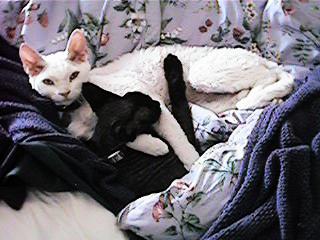Last night's class was once again refreshing. The class is getting more comfortable with each other. We had two birth stories, both of which were uplifting "I did it without drugs in a hospital" stories, although the common theme about giving birth in a hospital without standard interventions seems to be get there as late in labor as possible, completely dilated, so nobody has time to do anything to you.
The funniest comment of the night was from the guy who is a California State Highway Patrolman on giving his wife a heparin lock during labor. Heparin locks are IV needles stuck in your arm or hand that are not attached to tubing. They're better than a conventional IV because you're not tethered, but you still have a needle stuck in your arm when you've got better things to worry about. The nurses wanted to give his (fully-dilated and pushing) wife a heparin lock "just in case" she needed something, and he said, "No, I've seen enough strung-out, neurotic people come into emergency rooms who you give IVs to just fine. She's just a woman in labor. She'll be no problem." After my time in the ER, I have to agree. It was probably most compelling coming from a guy who looks like he could stunt double for Bruce Willis in Die Hard.
Little sparks of controversy happened when we started discussing AFP tests. Jan assumed we would all pass on the AFP test because "those tests are done to determine whether or not people will abort." I had an AFP test, and it wasn't because I would abort. We agonized over the AFP test, both about whether or not to take it and what the results were once we did. Eventually, we decided that since I have a sister who has Down's and was born with some pretty serious (read: life-threatening) birth defects, it was important to get an AFP to see if further (more invasive, more risky) testing was indicated. As much I want to give birth in the birth center and avoid a hospital birth, if we had any indication that the kid required an intensive neo-natal unit, we would switch to the hospital with the best neo-natal facilities in town. Happily, our AFP came back negative. It's not a guarantee of a 100% healthy baby, but it meant that I felt like I was making the responsible choice by passing on amnio. The risk/benefit ratio was just too out of whack at that point.
I didn't talk about all that in class, but I did find out that a couple of people in class have learning disability connections: one of the women in our class who is a kindergarten teacher has her specialty in Special Ed but needs to finish her CA certification before she can teach Special Ed here, and one of the men's mom was a lifelong Special Ed teacher (recently retired). It's interesting what you end up having in common with people.
Class 8 is supposed to be medical interventions in labor, but we still have the last set of vocabulary words to go through from Class 7. I haven't even looked to see what Class 9 is. We've got no class next week for the Memorial Day holiday.
skip to main |
skip to sidebar
Two babies here. Let's party.
About Me
Links
Blog Archive
-
▼
2006
(150)
-
▼
May
(22)
- Break Time
- Memorial Weekend Baby Blog Recap
- Blog angst
- Pediatrician Interview
- Standard Prenatal Visit, Week 31
- Bradley Class #8, um, #7 extended
- Everything's breaking
- Happy Independence Day!
- Bradley Class #7: Planning Your Birth
- The Braces Are Coming Off.
- Wowie Zowie!
- We regrouped!
- Foiled Again!
- Baby Product Showcase Showdown
- Prenatal Checkups: Now Every Two Weeks
- Bradley Class #6: Intro to Second Stage Labor
- Return of the Nap Monster
- Consignment Store Shopping
- You, Employer, are not my favorite charity.
- Bradley Class #5: 1st Stage of Labor
- Pregnancy/Birth Reading List
- I Love a Crusade
-
▼
May
(22)
Baby Books I Read During the Second Pregnancy
- Babies Don't Eat Pizza
- Birthing from Within
- Free-Range Kids
- Positive Discipline
- Pushed
- Siblings Without Rivalry
- The Creative Family
- Your Best Birth
Baby Books I Read During the (First) Pregnancy
- So That's What They're There For
- The Womanly Art of Breastfeeding (LLL guide)
- Becoming the Parent You Want to Be
- The Happiest Baby on the Block
- LilaGuide: San Diego Area
- Natural Childbirth the Bradley Way
- Immaculate Deception II
- Ina May's Guide to Childbirth
- The Nursing Mother's Companion
- A Woman in Residence
- Einstein Never Used Flash Cards
- The Year After Childbirth
- The Breastfeeding Book
- Silent Knife: Caesarian Prevention and Vaginal Birth After Caesarian (VBAC)
- Open Season: A Survival Guide for Natural Childbirth and VBAC in the 90s
- Husband-Coached Childbirth
- Childbirth Without Fear
- Obstetric Myths vs. Research Realities
- Life After Birth
- The Expectant Father
- The Secret Life of the Unborn Child
- The Family Bed
- The Complete Book of Pregnancy and Childbirth
Baby Books I Read Before Any Pregnancy
- The Baby Book, Sears and Sears
- The Pregnancy Book; Sears, Sears and Holt
- Misconceptions, Naomi Wolf
- The Girlfriend's Guide to Pregnancy
- The Thinking Woman's Guide to a Better Birth, Goer
- Baby Bargains, Fields and Fields
- Creative Parenting
- What to Expect When You're Expecting
